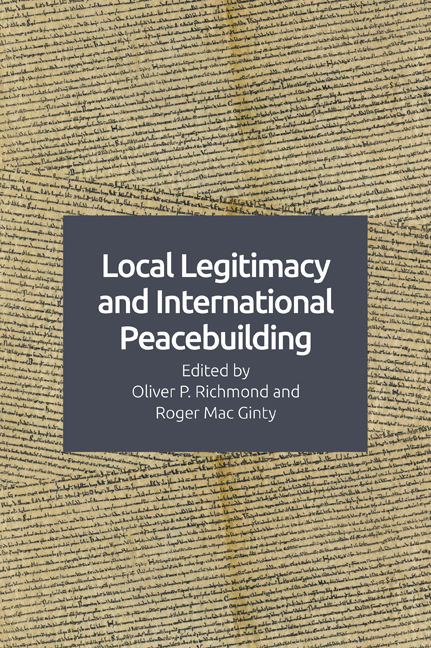Book contents
- Frontmatter
- Contents
- Contributors
- Foreword: The Riddle of Legitimacy
- Introduction: Legitimacy and Peace in the Age of Intervention
- One The Hybridization of Legitimacy in Processes of Peace Formation: the Bougainville Case
- Two International Intervention and Relational Legitimacy
- Three From a Divisive Peace Agreement to a Legitimate Peace in Colombia
- Four Banners, Billy Clubs and Boomerangs: Leveraging and Counter-Leveraging Legitimacy in the Occupied Palestinian Territory
- Five Peacebuilding as a Self-Legitimising System: The Case of Bosnia-Herzegovina
- Six ‘We Are There at Their Invitation’: Struggles for Legitimacy during the US Coalition Invasion–Occupation of Iraq
- Seven Inclusion and Performance as Sources of Legitimacy – the UN Mediation on Syria
- Eight Agonisation to Re-Legitimise the Postcolonial, Post-Conflict Somaliland
- Nine Third Party Legitimacy and International Mediation: Peacemaking through Pan-Africanism in Sudan
- Ten Post-War Legitimacy: A Framework on Relational Agency in Peacebuilding
- Eleven Legitimacy in Lebanon
- Conclusion: Peacebuilding and Legitimacy: Some Concluding Thoughts
- Index
Eight - Agonisation to Re-Legitimise the Postcolonial, Post-Conflict Somaliland
Published online by Cambridge University Press: 17 November 2020
- Frontmatter
- Contents
- Contributors
- Foreword: The Riddle of Legitimacy
- Introduction: Legitimacy and Peace in the Age of Intervention
- One The Hybridization of Legitimacy in Processes of Peace Formation: the Bougainville Case
- Two International Intervention and Relational Legitimacy
- Three From a Divisive Peace Agreement to a Legitimate Peace in Colombia
- Four Banners, Billy Clubs and Boomerangs: Leveraging and Counter-Leveraging Legitimacy in the Occupied Palestinian Territory
- Five Peacebuilding as a Self-Legitimising System: The Case of Bosnia-Herzegovina
- Six ‘We Are There at Their Invitation’: Struggles for Legitimacy during the US Coalition Invasion–Occupation of Iraq
- Seven Inclusion and Performance as Sources of Legitimacy – the UN Mediation on Syria
- Eight Agonisation to Re-Legitimise the Postcolonial, Post-Conflict Somaliland
- Nine Third Party Legitimacy and International Mediation: Peacemaking through Pan-Africanism in Sudan
- Ten Post-War Legitimacy: A Framework on Relational Agency in Peacebuilding
- Eleven Legitimacy in Lebanon
- Conclusion: Peacebuilding and Legitimacy: Some Concluding Thoughts
- Index
Summary
Introduction
This chapter highlights deliberation as a socio-political means of relegitimatising the postcolonial, post-conflict polity in a contractarian tradition, and explores an empirical inquiry into the case of Somaliland, the breakaway state of northern Somalia, in the short to medium term. While political philosophers have often viewed legitimacy as the entitlement of rulers to rule without coercive means, a classical school of contractarians hypothesised social contract as the source of political legitimacy. Hobbes conceptualised the social contract as emanating from individuals surrendering their rights to the mighty state for the sake of their liberties, while Locke considered it to lie between individuals and the constitutional government that saves the former's liberties from the Leviathan state. Rousseau, in turn, upheld democracy as a systemic cause for legitimation given that the elected government treats its citizens free from inequality and oppression. Extending this, Kant rationalised the monadic and dyadic cause for peace under liberal democracies. The Kantian rationale for perpetual peace has underpinned the charters of the League of Nations and the United Nations, and more recently the discourse of liberal peace. On the other hand, Weber underlined empirical reasoning for political legitimacy. His contention for legitimacy of the state which delivers public services and secures the rule of law in whatever form of regime has been pivotal in the discourse of statebuilding. The warfare which has prevailed since the end of the Cold War has conflated the discourses of liberal peace and statebuilding as the policy foundation of external intervention for peacebuilding.
The global consensus on liberal statebuilding has, however, overlooked the implications of (post)colonial historicity and culture for the legitimation problem with vertical and horizontal inequalities/differences in the non-Western context. Colonisation, in an attempt to build modern statehood in the traditional stateless societies, has effected socio-political ramifications although it is geopolitically, historically and culturally contingent. The colonisers’ introduction of indirect rule to employ the traditional leaders (e.g. kings, chiefs, elders) for the effective control of indigenous subjects formed the vertical inequality/difference between the colonial state and the colonised society at the polity level.
- Type
- Chapter
- Information
- Local Legitimacy and International Peace Intervention , pp. 180 - 198Publisher: Edinburgh University PressPrint publication year: 2020

